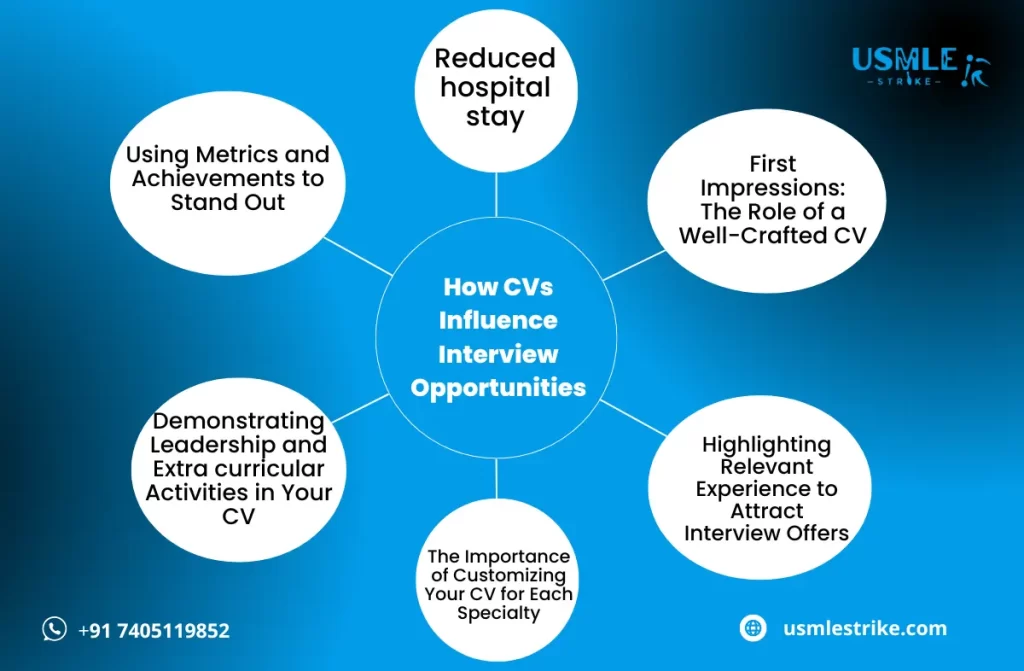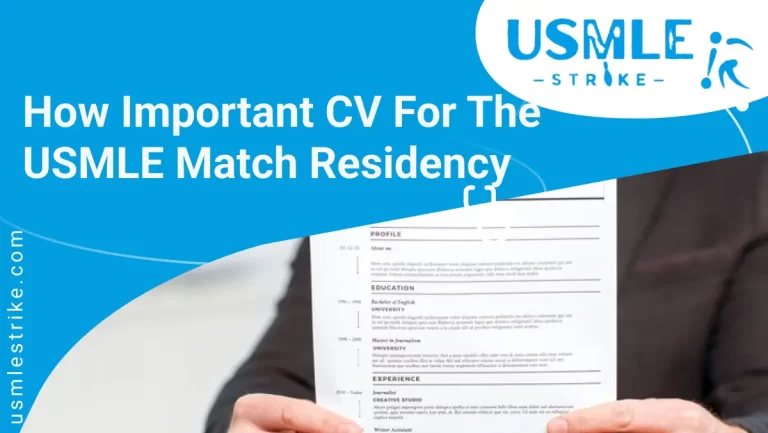Understanding How Important CV for the USMLE Match Residency is essential for all applicants seeking to match into a residency program. Your curriculum vitae (CV) serves as a comprehensive representation of your academic achievements, clinical experiences, research endeavors, and personal interests. A well-crafted CV can significantly influence your chances of securing interviews and, ultimately, a residency position. In this post explore, we will explore the critical role of your CV in the USMLE Match process and provide valuable insights on how to build an effective CV for residency.

The Role of CV in the Residency Application Process
First Impressions Matter
When it comes to the USMLE Match, your CV is often the first document program directors review. Understanding How Important CV for the USMLE Match Residency means recognizing that it sets the tone for your entire application. A well-organized, detailed CV highlights your qualifications and can make a lasting impression, while a poorly constructed one may lead to missed opportunities.
Highlighting Key Experiences
Your CV should effectively showcase your relevant experiences, including clinical rotations, research projects, volunteer work, and leadership roles. By strategically organizing these sections, you provide a clear narrative of your journey and suitability for a residency program. A compelling CV not only lists achievements but also emphasizes how these experiences have prepared you for the rigors of residency training.
How Important is CV for Residency?
Essential Component of the Application
The question of How important is CV for residency cannot be overstated. Alongside your personal statement and letters of recommendation, your CV is a fundamental part of your application. It serves as a comprehensive summary of your qualifications, enabling residency programs to assess your fit for their program quickly.
Competitive Edge
In a highly competitive field, a standout CV can provide you with a critical edge over other candidates. Programs receive numerous applications, so an organized and impressive CV can capture the attention of selection committees. It’s your opportunity to differentiate yourself and demonstrate why you are an ideal candidate for their residency program.
Building a CV for Residency
Structure and Formatting
When learning How to build a CV for residency, focus on structure and formatting. Your CV should be organized into clear sections, such as:
- Contact Information: Include your name, phone number, email, and LinkedIn profile (if applicable).
- Education: List your medical school, degree, and any relevant honors.
- Clinical Experience: Detail your rotations and any notable responsibilities or achievements.
- Research Experience: Highlight projects, publications, and presentations.
- Volunteer Work and Extracurricular Activities: Show commitment to service and leadership.
- Skills and Certifications: Include relevant skills and any certifications like ACLS or BLS.
Tailoring Your CV
Customization is key. Different residency programs may prioritize various experiences, so tailor your CV to emphasize the qualities and skills most relevant to each program. This ensures that your application speaks directly to what the program values.
CV Tips for Residency Applicants
Be Concise and Relevant
When considering CV Tips for Residency Applicants, remember to keep your CV concise and focused. Aim for a length of one to two pages, highlighting only the most relevant experiences and accomplishments. Avoid unnecessary jargon or overly technical terms that may detract from clarity.
Use Action Verbs
Utilize action verbs to describe your experiences effectively. Phrases like “conducted research,” “led a team,” and “provided patient care” convey your involvement and initiative. This not only makes your CV more engaging but also allows reviewers to quickly grasp your contributions and accomplishments.
Proofread and Seek Feedback
Finally, ensure that your CV is free from grammatical or typographical errors. These mistakes can undermine your professionalism and attention to detail. Seek feedback from mentors, peers, or advisors who can provide insights on how to enhance your CV further.
What Makes a Strong CV?
- Clear Structure: Organize your CV with distinct sections for easy navigation.
- Concise Content: Limit length to 1-2 pages; focus on relevant experiences.
- Action Verbs: Use strong action verbs to convey your achievements (e.g., “led,” “developed”).
- Tailored Information: Customize your CV for each application to highlight pertinent skills and experiences.
- Quantifiable Achievements: Include specific numbers or outcomes to demonstrate impact.
- Professional Formatting: Use consistent fonts, spacing, and headings for a polished look.
- Proofreading: Eliminate grammatical errors and typos to maintain professionalism.
Conclusion
Understanding How Important CV for the USMLE Match Residency is vital for any aspiring resident. Your CV serves as a powerful tool that reflects your qualifications, experiences, and readiness for residency training. By building a well-organized, tailored, and polished CV, you enhance your chances of standing out in the competitive residency application process. Remember, your CV is not just a list of achievements; it’s a narrative of your journey and aspirations in medicine.
Read also: Why Your USMLE CV Can Be Rejected





